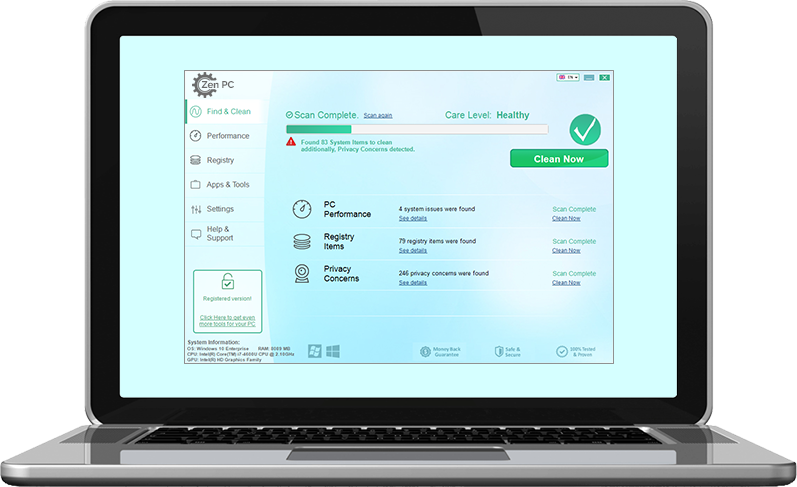What is Zen PC? What does Zen PC do? Is Zen PC safe? Can you trust Zen PC? Is Zen PC a virus?
The Zen PC Malware is a dangerous weapon used against computer users worldwide. It infects mainly via phishing email messages. Our article gives an overview of its behavior according to the collected samples and available reports, also it may be helpful in attempting to remove the virus.

Threat Summary
| Name | Zen PC |
| Type | Trojan |
| Short Description | The Zen PC Malware is a scam program that is designed to infiltrate computer systems. |
| Symptoms | The victims may not experience any apparent symptoms of infection. |
| Distribution Method | Phishing Messages, Freeware Installations, Bundled Packages, Scripts and others. |
| Detection Tool |
See If Your System Has Been Affected by malware
Download
Malware Removal Tool
|
| User Experience | Join Our Forum to Discuss Zen PC. |

Zen PC Malware – Distribution Methods
The Zen PC is a scam software utility which is distributed against computer users globally by an unknown hacking collective. Threats like this one are particularly popular as they will present themselves as an useful system software. This does not mean that every application called Zen PC is malicious by nature. It is very difficult to determine which is a real and useful application and which is the malware fraud one.
One of the main strategies used to spread the Zen PC is to coordinate the sending of phishing email messages and the creation of hacker-controlled servers which are made in order to manipulate the victims. They will be manipulated into believing that the contents comes from a well-known service or company. Through interaction with them the virus installation will begin. Usually the malicious sites and emails come from sites which are hosted on domain names that sound very similar to the legitimate home pages of the quoted services. They can also include self-signed or stolen security certificates.
The criminals can drive the infections by embedding malware code into various file carriers. The two most popular types are the following:
- Setup Packages — The Zen PC can be made part of an application installer without the users knowing about it. The criminals typically choose popular software which is often installed: system utilities, productivity tools and creativity suites. As soon as these installers are run the recipients may not know that they are to install a malware alongside another application.
- Macro-Infected Documents — They include macros that will lead to the Zen PC infection. The documents can be of all popular formats: presentations, text files, databases and spreadsheets. As soon as they are opened by the victims a prompt will appear asking them to enable the built-in code. If this is done the virus will be installed. Often different reasons are quoted in order to entice the users into doing so, the most popular one is the requirement in order to display correctly the contents of the file.
All of these files can be uploaded to different file-sharing networks like BitTorrent where pirate and legitimate data is often found. Larger infection campaigns can be done by including the necessary code in malicious web plugins — they can be uploaded to the relevant repositories with fake user reviews and an elaborate description. To go through the developer check the criminals can steal the credentials of plugin authors or fake them.

Zen PC Malware – Detailed Description
Depending on the actual local conditions and hacker instructions the application can function in an entirely different way from other similar threats. In most cases these malware threats will take the form of an useful system utility. This means that depending on the case the criminals can make the look like as completely functioning tool. However as soon as it is run it can launch a variety of dangerous malicious modules including the following:
- Information Theft — One of the most widely used strategies is to look for information that can expose the victims by looking for strings in memory and the hard disk contents that can reveal data like a person’s name, address, telephone number and etc. This can be used further for malicious purposes and crimes like identity theft. This particular module can also be used to generate a complete profile of the infected computer. This information can be used to generate an unique ID for every compromised host.
- Security Applications Removal — The gained intelligence about the computers can be used to identify if there are any running security applications which can block the proper execution of the threat. The list of the most popular ones include the following: anti-virus threats, firewalls, virtual machine hosts, sandbox and debug environments.
- Persistent Installation — The malicious Zen PC threat can be set to automatically start as soon as the victims power up their computers. This step can also disable access to the recovery boot options. This is very important as most manual user removal guides depend on them in order to attempt the malware recovery.
- Windows Registry Changes — The main engine can be used to commit changes to the Windows Registry by modifying existing values or creating new ones related to the Zen PC malware. The consequences of these actions can lead to problems when accessing certain app and system functions, data loss and the frequent unexpected errors.
- Data Removal — The engine of the malware can be programmed to ook for sensitive files which are to be removed. Usually these are important system data which are important for the proper functioning of the operating system. Examples include system restore points, shadow volume copies and backups.
- Additional Malware Infections — The made infections with the malicious versions of the Zen PC app can be used as conduits for other viruses.
What’s dangerous about this particular software is that it both mimics a real-world system utility and it can be used in various types of hacker attacks. It can be installed by other viruses or it can be used as a complex tool designed to deploy other malware. A popular option is to launch a Trojan module which will connect the infected machines to the predesignated hacker-controlled server allowing the criminals to take over control of the machines at any time, steal their data and carry out further dangerous threats.

Remove Zen PC Malware
If you want to remove the Zen PC Malware unwanted software from your computer we recommend that you use a specific anti-malware software. With a such an anti-malware program, your computer will remain with a better protection and stay healthy performance-wise in the future.
Preparation before removing Zen PC.
Before starting the actual removal process, we recommend that you do the following preparation steps.
- Make sure you have these instructions always open and in front of your eyes.
- Do a backup of all of your files, even if they could be damaged. You should back up your data with a cloud backup solution and insure your files against any type of loss, even from the most severe threats.
- Be patient as this could take a while.
- Scan for Malware
- Fix Registries
- Remove Virus Files
Step 1: Scan for Zen PC with SpyHunter Anti-Malware Tool
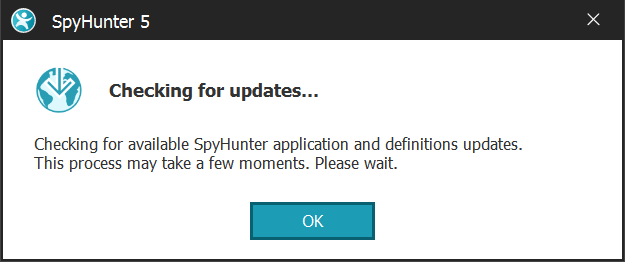
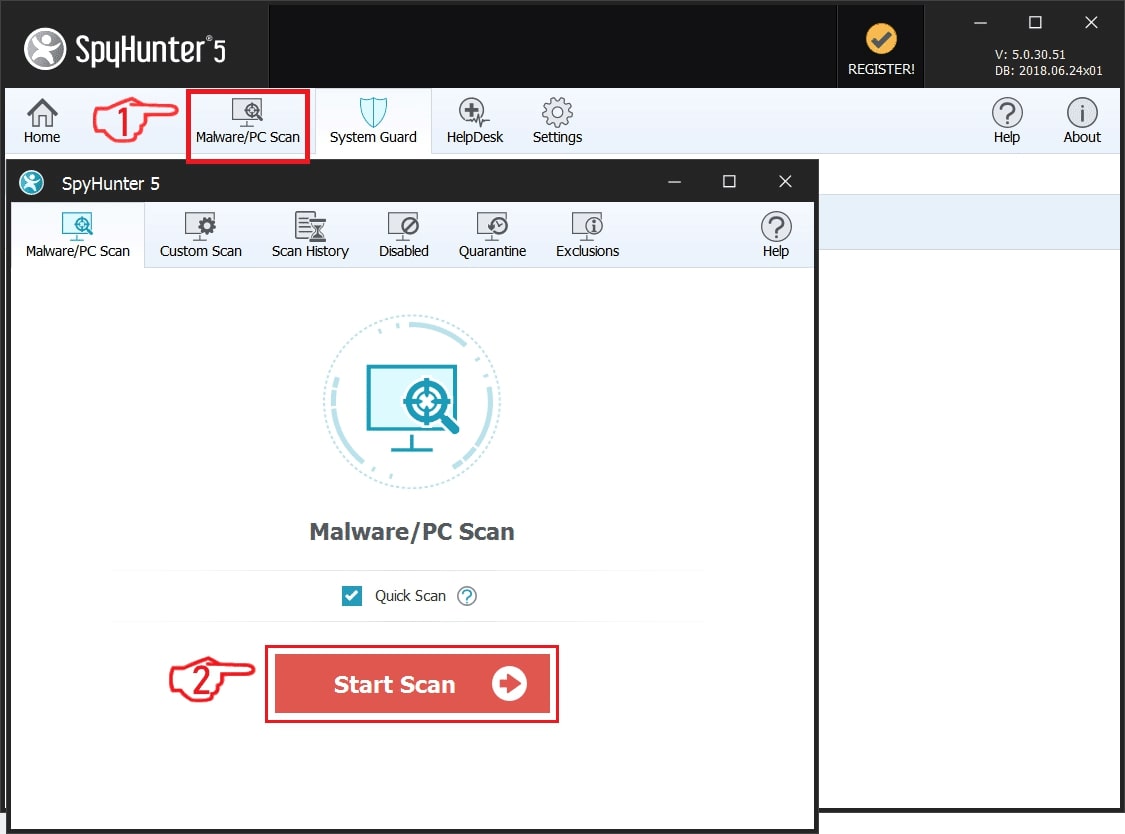
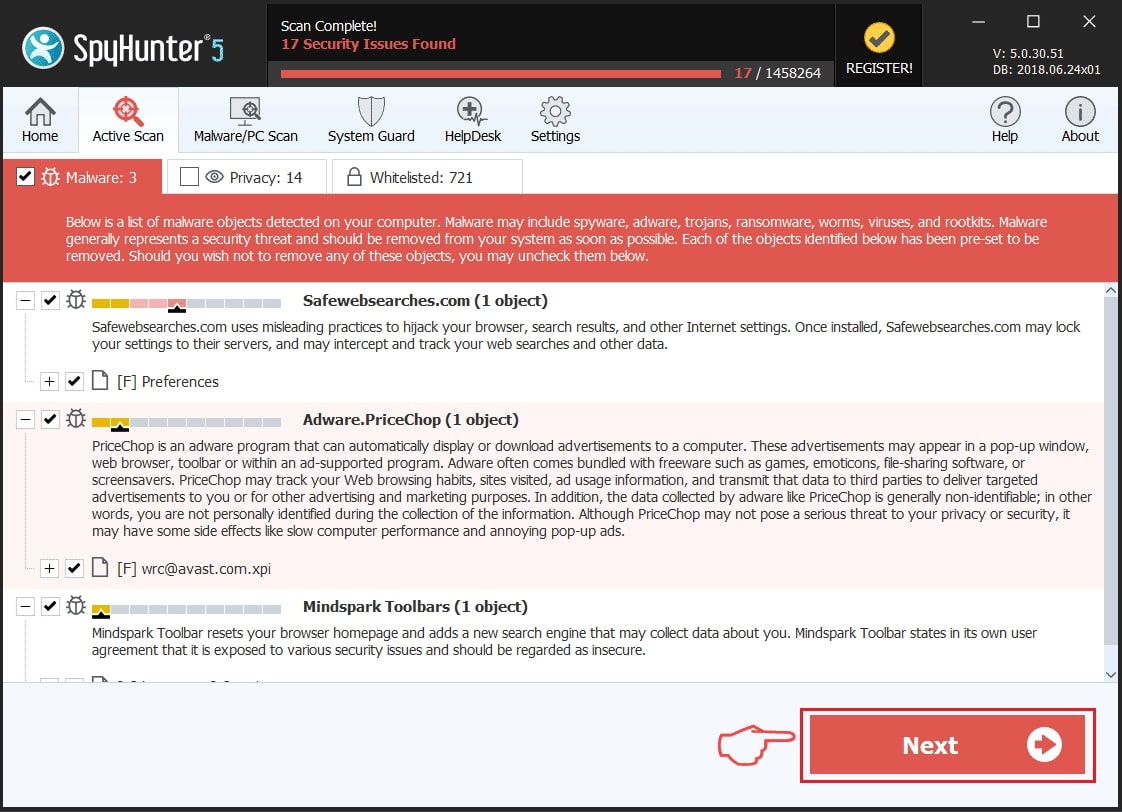
Step 2: Clean any registries, created by Zen PC on your computer.
The usually targeted registries of Windows machines are the following:
- HKEY_LOCAL_MACHINE\Software\Microsoft\Windows\CurrentVersion\Run
- HKEY_CURRENT_USER\Software\Microsoft\Windows\CurrentVersion\Run
- HKEY_LOCAL_MACHINE\Software\Microsoft\Windows\CurrentVersion\RunOnce
- HKEY_CURRENT_USER\Software\Microsoft\Windows\CurrentVersion\RunOnce
You can access them by opening the Windows registry editor and deleting any values, created by Zen PC there. This can happen by following the steps underneath:
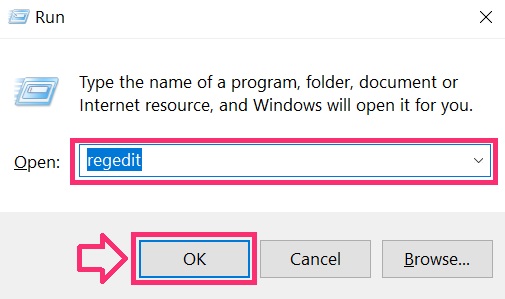

 Tip: To find a virus-created value, you can right-click on it and click "Modify" to see which file it is set to run. If this is the virus file location, remove the value.
Tip: To find a virus-created value, you can right-click on it and click "Modify" to see which file it is set to run. If this is the virus file location, remove the value.Step 3: Find virus files created by Zen PC on your PC.
1.For Windows 8, 8.1 and 10.
For Newer Windows Operating Systems
1: On your keyboard press + R and write explorer.exe in the Run text box and then click on the Ok button.
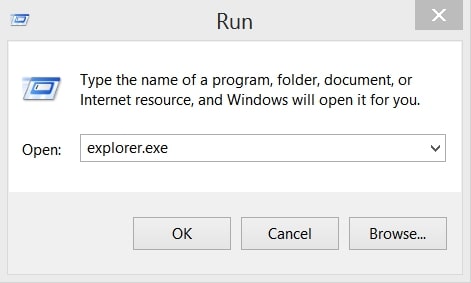
2: Click on your PC from the quick access bar. This is usually an icon with a monitor and its name is either “My Computer”, “My PC” or “This PC” or whatever you have named it.
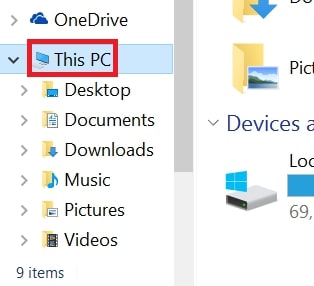
3: Navigate to the search box in the top-right of your PC's screen and type “fileextension:” and after which type the file extension. If you are looking for malicious executables, an example may be "fileextension:exe". After doing that, leave a space and type the file name you believe the malware has created. Here is how it may appear if your file has been found:
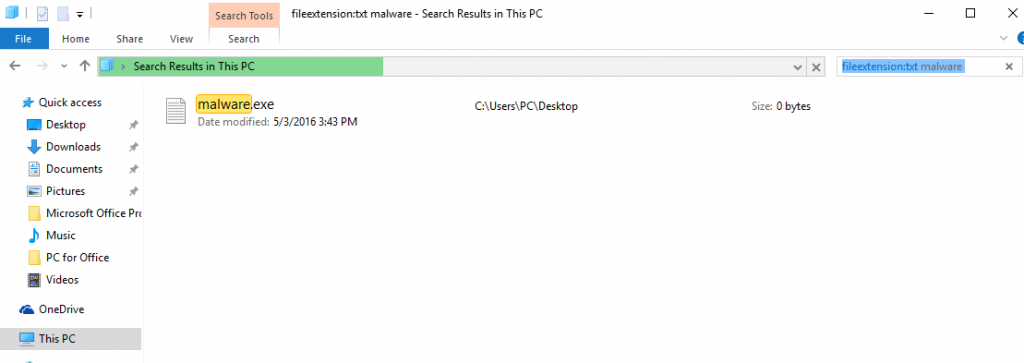
N.B. We recommend to wait for the green loading bar in the navigation box to fill up in case the PC is looking for the file and hasn't found it yet.
2.For Windows XP, Vista, and 7.
For Older Windows Operating Systems
In older Windows OS's the conventional approach should be the effective one:
1: Click on the Start Menu icon (usually on your bottom-left) and then choose the Search preference.
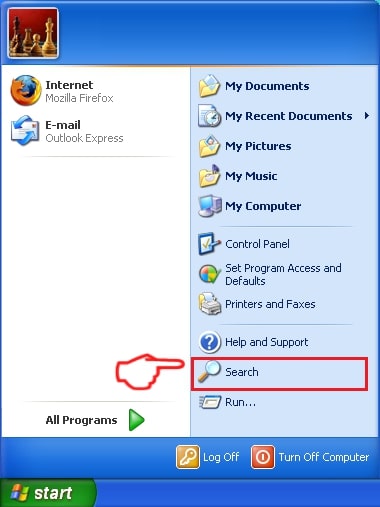
2: After the search window appears, choose More Advanced Options from the search assistant box. Another way is by clicking on All Files and Folders.
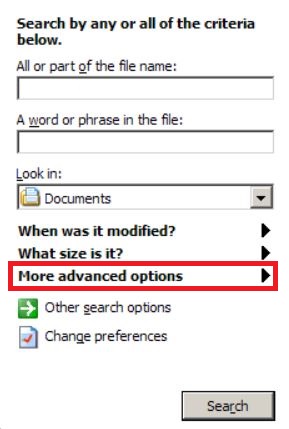
3: After that type the name of the file you are looking for and click on the Search button. This might take some time after which results will appear. If you have found the malicious file, you may copy or open its location by right-clicking on it.
Now you should be able to discover any file on Windows as long as it is on your hard drive and is not concealed via special software.
Zen PC FAQ
What Does Zen PC Trojan Do?
The Zen PC Trojan is a malicious computer program designed to disrupt, damage, or gain unauthorized access to a computer system. It can be used to steal sensitive data, gain control over a system, or launch other malicious activities.
Can Trojans Steal Passwords?
Yes, Trojans, like Zen PC, can steal passwords. These malicious programs are designed to gain access to a user's computer, spy on victims and steal sensitive information such as banking details and passwords.
Can Zen PC Trojan Hide Itself?
Yes, it can. A Trojan can use various techniques to mask itself, including rootkits, encryption, and obfuscation, to hide from security scanners and evade detection.
Can a Trojan be Removed by Factory Reset?
Yes, a Trojan can be removed by factory resetting your device. This is because it will restore the device to its original state, eliminating any malicious software that may have been installed. Bear in mind that there are more sophisticated Trojans that leave backdoors and reinfect even after a factory reset.
Can Zen PC Trojan Infect WiFi?
Yes, it is possible for a Trojan to infect WiFi networks. When a user connects to the infected network, the Trojan can spread to other connected devices and can access sensitive information on the network.
Can Trojans Be Deleted?
Yes, Trojans can be deleted. This is typically done by running a powerful anti-virus or anti-malware program that is designed to detect and remove malicious files. In some cases, manual deletion of the Trojan may also be necessary.
Can Trojans Steal Files?
Yes, Trojans can steal files if they are installed on a computer. This is done by allowing the malware author or user to gain access to the computer and then steal the files stored on it.
Which Anti-Malware Can Remove Trojans?
Anti-malware programs such as SpyHunter are capable of scanning for and removing Trojans from your computer. It is important to keep your anti-malware up to date and regularly scan your system for any malicious software.
Can Trojans Infect USB?
Yes, Trojans can infect USB devices. USB Trojans typically spread through malicious files downloaded from the internet or shared via email, allowing the hacker to gain access to a user's confidential data.
About the Zen PC Research
The content we publish on SensorsTechForum.com, this Zen PC how-to removal guide included, is the outcome of extensive research, hard work and our team’s devotion to help you remove the specific trojan problem.
How did we conduct the research on Zen PC?
Please note that our research is based on an independent investigation. We are in contact with independent security researchers, thanks to which we receive daily updates on the latest malware definitions, including the various types of trojans (backdoor, downloader, infostealer, ransom, etc.)
Furthermore, the research behind the Zen PC threat is backed with VirusTotal.
To better understand the threat posed by trojans, please refer to the following articles which provide knowledgeable details.


